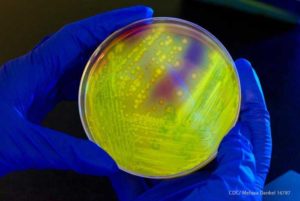Can I Sue a Food Company If I Got Sick from Recalled Food?
Yes, if your illness can be linked to the recalled food, you may have the right to personally sue a company for compensation. Our attorneys will help you determine if you have a case and handle all aspects of the legal work required. A food recall lawsuit generally involves an outbreak of illness caused by food contaminated with one of the following pathogens:
A recall lawsuit for personal injury or wrongful death is generally not filed as a class action.
Our lawyers help people sickened by contaminated food. Some of our results include $4.5 million for a woman who contracted an E. coli infection and developed hemolytic uremic syndome (HUS), $3,500,000 for a mother who contracted a Listeria infection (listeriosis) while pregnant and lost her unborn twins, and $2,700,000 to a family whose loved one died after eating contaminated food.

Recalls of Food Products Announced by the FDA and the USDA-FSIS
Pritzker Hageman attorneys have been interviewed by The New York Times, The Wall Street Journal, Lawyers USA, and other publications. Fred Pritzker is also listed in The Best Lawyers in America. To contact Pritzker Hageman, P.A., please call toll-free at 1-888-377-8900 or submit the firm’s free case consultation form.
Charcuterie Packages Sold at Sam’s Club and Costco Recalled Due to Salmonella Contamination
Fratelli Beretta Antipasto sold at Costco and Busseto Charcuterie sold at Sam’s Club have been recalled in connection with a multistate Salmonella outbreak. Consumers who have purchased this product should not eat it.
Raw Onions, Imported from Mexico, Recalled for Salmonella Contamination
Red, white, and yellow onions, imported from Mexico by ProSource Produce, LLC between July 1 – August 27, 2021 have been recalled after being linked to a Salmonella outbreak that has sickened at least 652 people in 37 states. These onions have been sold to restaurants, food services (like schools, hospitals, prisons, catering companies and nursing homes), as well as at retail and wholesale stores.
Northeast Seafood Products Issues Recall in Salmonella Outbreak Linked to Fish Consumption
The recalled seafood was sold at restaurants and at grocery stores, including: Albertsons, Safeway, and Sprouts in Colorado between May 2021 to October 7, 2021. Illnesses have been reported from eating both raw and cooked fish.
The recall includes Haddock, Monkfish, Bone-in Trout, Grouper, Red Snapper, Red Rock Cod, Ocean Perch, Pacific Cod, Halibut, Coho Salmon, Atlantic Salmon Portions, Lane Snapper, Tilapia, All Natural Salmon Fillet, Pacific Sole, and Farm-Raised Striped Bass.
Johnson County Ham Recall Due to Listeria Risk
A Listeria outbreak in Virginia and North Carolina was linked to ham products processed by Johnston County Hams, Inc. facility in Smithfield, North Carolina, according to the CDC. In response, the company issued a recall on October 3, 2018, of the following products:
- Johnston County Hams, Inc. Country Style Fully Cooked Boneless Deli Ham
- Goodnight Brothers Country Ham Boneless Fully Cooked
- Padow’s Hams & Deli, Inc. Fully Cooked Country ham Boneless Glazed with Brown Sugar
- Ole Fashioned Sugar Cured The Old Dominion Brand Hams Premium Fully-Cooked Country Ham with sell-by dates from 4/10/2018 to 9/27/2019
- Premium Fully-Cooked Country Ham Less Salt Distributed by Valley Country Hams, LLC. with sell-by dates from 4/10/2018 to 9/27/2019
The recalled products are marked with the establishment number “EST. M2646” inside the USDA mark of inspection.
JBS Tolleson Recalls Ground Beef and Ground Chuck
JBS Tolleson recalled about 6.5 million pounds of ground beef and ground chuck sold under the following brands: Cedar River Farms Natural Beef, Comnor Perfect Choice, Gourmet Burger, Grass Run Farms Natural Beef, JBS Generic, Showcase and Showcase/ Walmart. This recall was issued after a Salmonella outbreak that sickened 57 people in 16 states was linked to eating the products, according to the U.S. Department of Agriculture’s Food Safety and Inspection Service (USDA-FSIS). The recalled products were packaged from July 26 to Sept. 7, 2018, and they have the establishment number “EST. 267”.
Beef Recall: Sold at Meijer, Safeway, Sam’s Club, Target
Before a September 2018 Cargill ground beef recall, products were distributed to the following: Meijer, Safeway and Sam’s Club stores nationwide; Target stores in five states; and Publix stores in Florida.
Cargill Recall of Ground Beef after E. coli O26 Illnesses
At least 18 people in 4 states have been sickened in an E. coli O26 outbreak that the CDC and FDA have linked to Cargill ground beef. The outbreak prompted a September 2018 recall by Cargill Meat Solutions of Fort Morgan, Colorado, which recalled over 130,000 pounds of beef products with the establishment number “EST. 86R” inside the USDA mark of inspection.
Salmonella Illnesses Prompt Gravel Ridge Farm Egg Recall
Gravel Ridge Farm issued a recall in September of 2018 of shell eggs due to the risk of Salmonella contamination. The recall was issued because Salmonella illnesses were linked to the eggs. The recalled eggs were sold in Alabama, Tennessee, and Georgia at restaurants and grocery stores, including Piggly Wiggly, Warehouse Discount Grocery and Western Market stores. The recall includes eggs packaged in single dozen cartons and 2.5 dozen flats with the UPC 7-06970-38444-6 and “use by” dates from July 25, 2018, through October 31, 2018.
Hy-Vee Salad Recall | Lawyers Investigating Salmonella Outbreak in IA, MN, NE, and SD
After reports of Salmonella food poisoning in Iowa, Minnesota, and South Dakota, Hy-Vee, Inc. recalled its Hy-Vee Spring Pasta Salad in July of 2018 because it may be contaminated with Salmonella. The recall includes Hy-Vee Spring Pasta Salads in both 1 pound (16 oz.) and 3 pound (48 oz.) containers. The products were produced between June 1, 2018, and July 13, 2018, and they were available from the deli service case. The pasta salad was distributed to all of Hy-Vee grocery stores in Iowa, Illinois, Missouri, Kansas, Nebraska, South Dakota, Minnesota and Wisconsin.
Salmonella Outbreak Prompts Recall of Caito Foods Melon Products
Pre-cut watermelon, honeydew and cantaloupe products produced by Caito Foods, an Indianapolis company, were recalled in June of 2018 after the FDA determined they were the likely source of a multi-state Salmonella outbreak that sickened 60 people. The included fruit salads and trays, melon chunks, and spears. They were sold at Costco, Kroger, Sprouts, Trader Joe’s, Walgreens, Walmart and other stores. Five states reported 60 illnesses: IL (6), IN (11), MI (32), MO (10), OH (1). People started getting sick in April of 2018, and the last reported illness was on May 28, 2018.
Fareway Foods Chicken Salad Recall Lawsuits
The CDC and FDA linked an outbreak of Salmonella food poisoning in early 2018 to chicken salad made by Triple T Specialty Meats, Inc. and sold at Fareway grocery stores. Prompted by this outbreak, Triple T Specialty Meats issued a February 2018 recall of about 20,000 pounds of chicken salad made between Jan. 2, 2018 and Feb. 7, 2018. The Fareway Foods chicken salad Salmonella Typhimurium outbreak sickened people in Iowa, Illinois, Minnesota, Nebraska and South Dakota. Pritzker Hageman attorneys filed several lawsuits for people sickened by Fareway chicken salad.
Shredded Coconut Recall for Salmonella
A Salmonella outbreak that started in Boston and eventually involved 25 people in 9 states prompted a January 2018 recall of shredded coconut. Evershing International Trading Company recalled the following: 16 ounces Coconut Tree Brand Frozen Shredded Coconut (Item number 331223, UPC 05216-44081). The recalled frozen shredded coconut, packaged in 16-once plastic bags, was distributed to several states: Ohio, Massachusetts, Washington, California, Oklahoma, Illinois, Michigan, New Jersey, New York, Pennsylvania, Oregon, Florida, and Texas. This involved products sold from January 3, 2017 through January 3, 2018.
